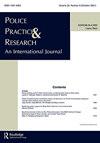Effective reassurance policing after collective trauma events: Perceptions of Australian police
IF 1.8
Q2 CRIMINOLOGY & PENOLOGY
引用次数: 0
Abstract
ABSTRACT Crimes on the scale of a collective trauma event (CTE) can generate fear, grief, and a sense of injustice that impact beyond those directly affected. Increasingly, reassurance policing is mobilised to restore a sense of community safety and security. Yet little is evidenced as to what constitutes effective reassurance policing, and its barriers and enablers. This study examined police perceptions of good reassurance practice within Victoria Police, Australia. Two focus groups were conducted (senior command (n = 17) and frontline operational staff groups, (n = 9)) and data were analysed using inductive thematic analysis. Five components of good reassurance practice were identified – (1) understanding the purpose of reassurance; (2) assessing the unique context of each CTE; (3) implementing the key strategies of reassurance; (4) using the core skills of reassurance; and (5) having reassurance guidelines. Based on these findings, key skill and strategy areas are proposed for inclusion in an organisational reassurance framework. Alongside these policy and practice proposals, we recommend that larger scale, multisite, and mixed-method studies of reassurance practices are needed to enable opportunities to triangulate perspectives of diverse police and community groups.集体创伤事件后有效的安抚警察:对澳大利亚警察的看法
集体创伤事件(CTE)规模的犯罪可以产生恐惧,悲伤和不公正感,其影响超出了直接受影响的人。越来越多的安抚警察被动员起来,以恢复社区的安全感。然而,关于什么是有效的安抚政策,以及它的障碍和推动因素,几乎没有证据。这项研究调查了澳大利亚维多利亚州警察对良好的保证实践的看法。进行了两个焦点小组(高级指挥官组(n = 17)和前线作战人员组(n = 9)),并使用归纳专题分析对数据进行了分析。确定了良好保证实践的五个组成部分:(1)理解保证的目的;(2)评估每个CTE的独特背景;(三)实施安心重点战略;(4)运用安心核心技能;(5)制定安心指南。基于这些发现,建议将关键技能和战略领域纳入组织保证框架。除了这些政策和实践建议外,我们建议需要更大规模、多地点和混合方法的保证实践研究,以便有机会对不同警察和社区团体的观点进行三角测量。
本文章由计算机程序翻译,如有差异,请以英文原文为准。
求助全文
约1分钟内获得全文
求助全文
来源期刊

Police Practice and Research
CRIMINOLOGY & PENOLOGY-
CiteScore
4.10
自引率
5.60%
发文量
50
期刊介绍:
Police Practice and Research is a peer-reviewed journal that presents current and innovative police research as well as operational and administrative practices from around the world. Articles and reports are sought from practitioners, researchers and others interested in developments in policing, analysis of public order, and the state of safety as it affects the quality of life everywhere. Police Practice and Research seeks to bridge the gap in knowledge that exists regarding who the police are, what they do, and how they maintain order, administer laws, and serve their communities. Attention will also be focused on specific organizational information about the police in different countries or regions. There will be periodic special issues devoted to a particular country or continent.
 求助内容:
求助内容: 应助结果提醒方式:
应助结果提醒方式:


